Communities forging a path forward: Top 10 photos of 2023
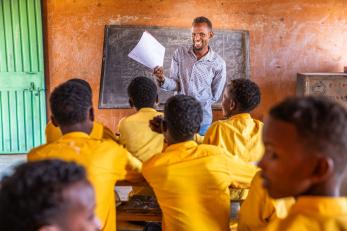
Each year as we plan our schedule for collecting stories and photos around the world in the communities where we work, it’s impossible to predict what the coming months will bring. In 2023, the war in Ukraine continued into a second year, climate change brought on catastrophes globally, and in the Middle East—the region where I live—we’re experiencing the impact of natural disasters and conflict. From emergency crises to building community resilience, Mercy Corps has continued to respond to these challenges by providing critical support and offering more sustainable solutions for long-term recovery—and this work is reflected in our top ten photos of the year.
In this year’s photo selections, the range of emotions represented in our imagery stands out: from bright classroom smiles in Ethiopia to dusty camps for displaced people in Syria, colorful sacks of Guatemalan crops to the heat-baked plains of southern Pakistan. As I look back at these photos taken by myself and our roster of photographers, it’s obvious that regardless of geography, we all have the same priorities, needs, and dreams—for our families to be safe, to have enough to eat, clean water to drink, and most of all, peace.
The ten photos below reflect our commitment to helping communities facing conflict and climate change, ensuring that they have access to resources and support to forge a new path forward to reshape the world we share.
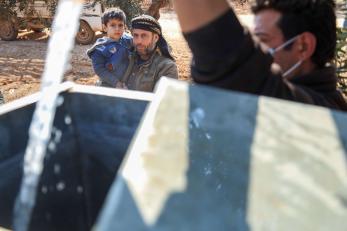
In February 2023, a 7.8 magnitude earthquake struck Northwest Syria. The earthquake and aftershocks caused widespread destruction across Syria and Turkey, with a death toll of over 50,000 people and more than 1,700 buildings collapsed or were damaged. In this photo, Abdullah (whose name has been changed to protect his privacy) watches on with his son as a Mercy Corps team member refills a water tank with clean, potable water at a camp for people who had been displaced. Mercy Corps has been supporting residents of the camp with water for years, but this took on added importance in the wake of the massive earthquake.
The depth and layers of this photo give it a strong, unique composition, which is typical of Qusai Shabib’s work. He achieves this while still connecting us to the subjects through eye contact. “The photo shows Mercy Corps’ hope for families who have been living in the camps for years without work or income,” said Qusai. “The hope in this image is the basic need for water for the continuation of their lives, which has increased dramatically during the earthquake that struck the region in February 2023.”
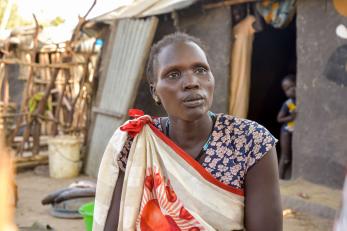
Nyediet comes from a community in Unity State, South Sudan who relied on agriculture and livestock for their livelihoods before floods washed everything away. With her home trapped under floodwaters, Nyediet and her family had to relocate and face the challenge of finding enough food to survive. This is the fourth consecutive year that South Sudan has faced climate change-induced flooding, displacing more than a million people.
Mercy Corps is working to improve access to safe water, sanitation, and hygiene services for communities affected by the flooding by rehabilitating boreholes in villages and camps for displaced people, constructing communal latrines, providing hygiene trainings, and distributing hygiene kits that include soap and women’s sanitary products.
Mercy Corps’ Edward Ahonobadha captured this image. “This photo is powerful for me,” Edward said, “because it is impossible to describe her blank stare and emotions when she speaks… when you hear her story, you can only imagine how strong she is, because strong is the only option available as she heads the household holding onto hope. If strong was a person, she is the person.”
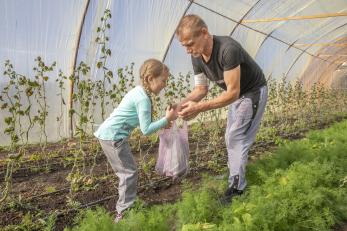
In Poltava Oblast, Ukraine. Alisa, and her grandfather Valerii roam their greenhouse, bending every so often to harvest vegetables, laughing, and talking. Her mother, Maryna, is a farmer who operated two stores selling produce from her 60-acre farm before the war. When conflict reached their village and forced them to shut down and move, they left behind almost all of their possessions, including much of their farming equipment and inventory.
After relocating to Poltava Oblast, they used their savings to purchase a few acres of land, in order to begin farming and beekeeping once again. With cash aid from Mercy Corps, Maryna and her family purchased the supplies and an irrigation system for a new greenhouse. The family built it by hand, and they are now growing cucumbers, green onions, and other leafy greens, which they will sell to shops in the town to support themselves.
In October, as autumn slowly descended into another icy Ukrainian winter, it was a bit shocking to step inside this warm humid greenhouse, full of greenery and life. It was a joy to follow Alisa and her grandfather around as they picked and snacked on cucumbers.
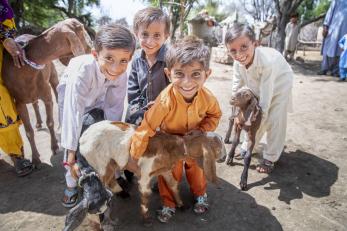
Southern Pakistan had been inundated with historic floods in 2022. Communities in Sindh province experienced catastrophic damage, with the floods destroying their homes and crops of wheat and rice. Across areas in Sindh, Mercy Corps provided cash aid to families like Hanifa’s, who had been displaced for three months before returning to their small village to find that they had lost everything. Her village is home to about 50 families, and lacks schools, running water, electricity, and employment opportunities.
Hanifa used the cash aid to buy a pregnant goat, which provided milk and gave birth to baby goats that are seen in this photo with her four sons. In the future, Hanifa will sell the goats to earn income to support her family. After 20 years working as a professional photographer, I have found that few photos can compete with the pure joy of children playing with goats.
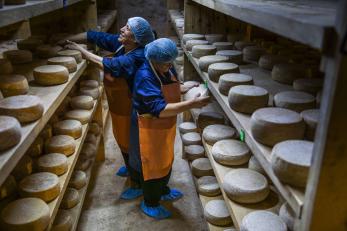
Kholoud (left), and her colleague Aheda inspect cheese that is ripening in an ancient Roman cave beneath the Formajo cheese company in Karak, Jordan. Kholoud has worked at the company since 2018 where she manages all cheese production and has learned to make labneh. When her husband fell sick, she was able to supplement their family income and support their children through this job. Kholoud was trained by the Habibi Valtiberina Association, which received a grant from Mercy Corps to support their social business enterprise.
It was a hot summer day in Jordan; walking through an unremarkable door, down a flight of stairs, and into a thousand-year-old Roman cave felt like stepping back in time. The repeating shapes and dramatic lighting were a photographer’s playground. And the cheese was delicious!
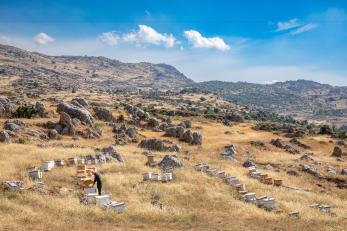
On a hillside in Rachaya, Lebanon, Ramzi tends to his 250 beehives. He learned the trade from his father when he was a teenager and now specializes in making honey, bee pollen, propolis, beeswax, and royal jelly. By participating in Mercy Corps programs, Ramzi has received in-kind processing equipment, and trainings that provided growth opportunities and market linkages. Through the programs, he has revamped his brand identity and received ten thermo beehives that enhance both the quantity and quality of the bee pollen he produces.
After driving for hours into the far reaches of the Bekaa Valley, I was astonished when we came around a bend and saw Ramzi’s hives nestled on this warm, breezy hillside, surrounded by mountains. I asked him if he needed to hire an assistant. He said he would get back to me.
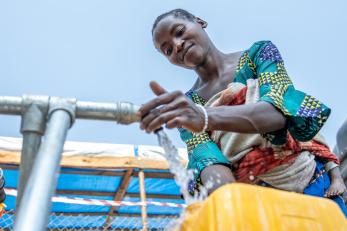
Odette lives in the Kashaska camp for internally displaced people near Goma, Democratic Republic of the Congo. Her family fled conflict and she relies on essential support like access to clean drinking water, provided throughout the camp by Mercy Corps.
Mercy Corps photographer Rudy Nkombo recounted meeting Odette, “In the grey dust, I see hundreds of tarpaulin huts stretching to the horizon. Under an oppressive sun, dust, and heat rise from the earth. Mercy Corps engineering teams are setting up a water bladder. I need to quench my thirst. I wonder what it's like for the families who fled the conflict and find themselves in conditions where water has become a scarce commodity in this site of displaced people.
“I lie down to take this photo of Odette to express the communion that exists between water and Odette. Drinking water is an essential commodity for Odette and her children. She’s a brave woman, because she had to walk a long way to get it. As water is life, Odette and her family have a right to clean drinking water. Pure is the water, pure is her soul. I pray that peace will be restored and that she will regain her peace of mind.”
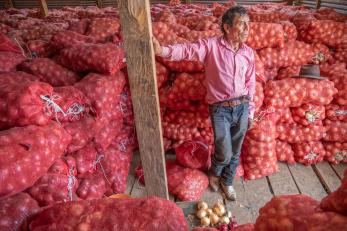
Apolonio is a farmer and father in Cunen, Guatemala. He says that climate change has had an impact on his productivity, and there is a stark difference in the quality of the onion crops as well. This is a story we hear frequently as we photograph farmers around the world. Climate change leaves no corner of the world untouched. I spend a lot of time in arid places that are suffering from drought, so being in lush Guatemala was a stark reminder that even fertile, tropical places are being affected.
Through a Mercy Corps program, Apolonio opened an onion storage facility and received support to sell in new markets which help to increase income, productivity, and resilience to climate change. I was excited as I walked into this warehouse, seeing the bright red colors and repeating patterns, with a soft angled light coming from the open large barn doors. Apolonio leaned casually against a beam while speaking to us; his hat resting on the bags and small pile of onions at his feet gave the photo scale and balance.

The Zaatari refugee camp is the largest camp in the Middle East and home for about 80,000 Syrian refugees in Jordan who had been displaced due to conflict. One of Mercy Corps’ programs in the camp provides innovative adventure therapy and personal development, delivering psychosocial support for young people, including at-risk and unemployed youth. By participating in adventure-focused activities, young people are encouraged to release negative emotions, build trust and confidence, connect with their peers, and reduce stress through activities like climbing the only climbing wall in Zaatari.
The colorful wall and climbing grips provide a lively background for this image, while the strength in this young participant’s limbs and confident smile on her face are perfectly emblematic of the program. This program and photo resonated with me personally, as my daughter recently started rock climbing, and I’ve seen how it has boosted her confidence.
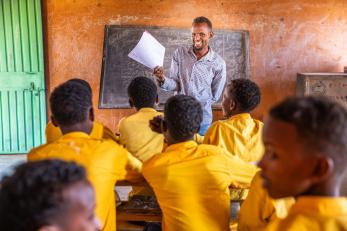
Mahamad is a teacher in Shabelle, Ethiopia, where many of his students walk an hour from home to attend school. Mahamad says that he always wanted to be a teacher because he believes it’s the best way to serve his community and give back—and he’s now teaching at the same school that he attended when he was a child.
During his lessons, he teaches his students about health, sanitation, and nutrition, as part of a Mercy Corps program supporting food security and hygiene. Since September 2022 the program has been training teachers and school administrators about sanitation and health issues, so that they can teach it to their students.
He welcomed us into the classroom with great pride, and was excited to show us his work. Classrooms are one of my favorite places to photograph—there is often a tangible energy, visible connections between students and teachers, and particularly in east Africa, bright colorful uniforms that offer a dynamic palette. Mahamad’s expression tells us all we need to know about his relationship to his work and his students.
